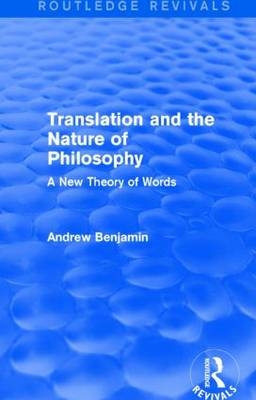
Translation and the Nature of Philosophy (Routledge Revivals)
A New Theory of Words
Seiten
2014
Routledge (Verlag)
978-1-138-77912-9 (ISBN)
Routledge (Verlag)
978-1-138-77912-9 (ISBN)
First published in 1989, this study explores the basic mutuality between philosophy and translation. By studying the conceptions of translation in Plato, Seneca, Davidson, Walter Benjamin and Freud, Andrew Benjamin reveals the interplay between the two disciplines not only in their relationship to language, but also at a deeper, cognitive level.
This engrossing study, first published in 1989, explores the basic mutuality between philosophy and translation. By studying the conceptions of translation in Plato, Seneca, Davidson, Walter Benjamin and Freud, Andrew Benjamin reveals the interplay between the two disciplines not only in their relationship to language, but also at a deeper, cognitive level.
Benjamin engages throughout with the central tenets of post-structuralism: the concept of a constant yet illusive ‘true’ meaning has lost authority, but remains a problem. The fact of translation seems to defy the notion that ‘meaning’ is reducible to its component words; yet, to say that the ‘truth’ is more than the sum of its parts, we are challenging the very foundations of what it is to communicate, to understand, and to know. In Translation and the Nature of Philosophy, the author sets out his own theory of language in light of these issues.
This engrossing study, first published in 1989, explores the basic mutuality between philosophy and translation. By studying the conceptions of translation in Plato, Seneca, Davidson, Walter Benjamin and Freud, Andrew Benjamin reveals the interplay between the two disciplines not only in their relationship to language, but also at a deeper, cognitive level.
Benjamin engages throughout with the central tenets of post-structuralism: the concept of a constant yet illusive ‘true’ meaning has lost authority, but remains a problem. The fact of translation seems to defy the notion that ‘meaning’ is reducible to its component words; yet, to say that the ‘truth’ is more than the sum of its parts, we are challenging the very foundations of what it is to communicate, to understand, and to know. In Translation and the Nature of Philosophy, the author sets out his own theory of language in light of these issues.
Acknowledgments; Introduction 1. The Literal and the Figural Translated 2. Seneca and the Translation of Being 3. The Mediated Touch: Davidson and Translation 4. Walter Benjamin and the Translator’s Task 5. Psychoanalysis and Translation 6. Translation and Philosophy; Notes; Index
| Reihe/Serie | Routledge Revivals |
|---|---|
| Verlagsort | London |
| Sprache | englisch |
| Maße | 138 x 216 mm |
| Gewicht | 660 g |
| Themenwelt | Geisteswissenschaften ► Philosophie ► Geschichte der Philosophie |
| Geisteswissenschaften ► Philosophie ► Philosophie der Neuzeit | |
| Geisteswissenschaften ► Philosophie ► Sprachphilosophie | |
| Geisteswissenschaften ► Sprach- / Literaturwissenschaft ► Sprachwissenschaft | |
| ISBN-10 | 1-138-77912-1 / 1138779121 |
| ISBN-13 | 978-1-138-77912-9 / 9781138779129 |
| Zustand | Neuware |
| Haben Sie eine Frage zum Produkt? |
Mehr entdecken
aus dem Bereich
aus dem Bereich
die kolonialen Wurzeln der französischen Theorie
Buch | Hardcover (2024)
Matthes & Seitz Berlin (Verlag)
28,00 €
oder Das Leben Montaignes in einer Frage und zwanzig Antworten
Buch | Softcover (2023)
C.H.Beck (Verlag)
18,00 €
eine Geschichte der Zuversicht von Homer bis zum Klimawandel
Buch | Hardcover (2024)
C.H.Beck (Verlag)
28,00 €


